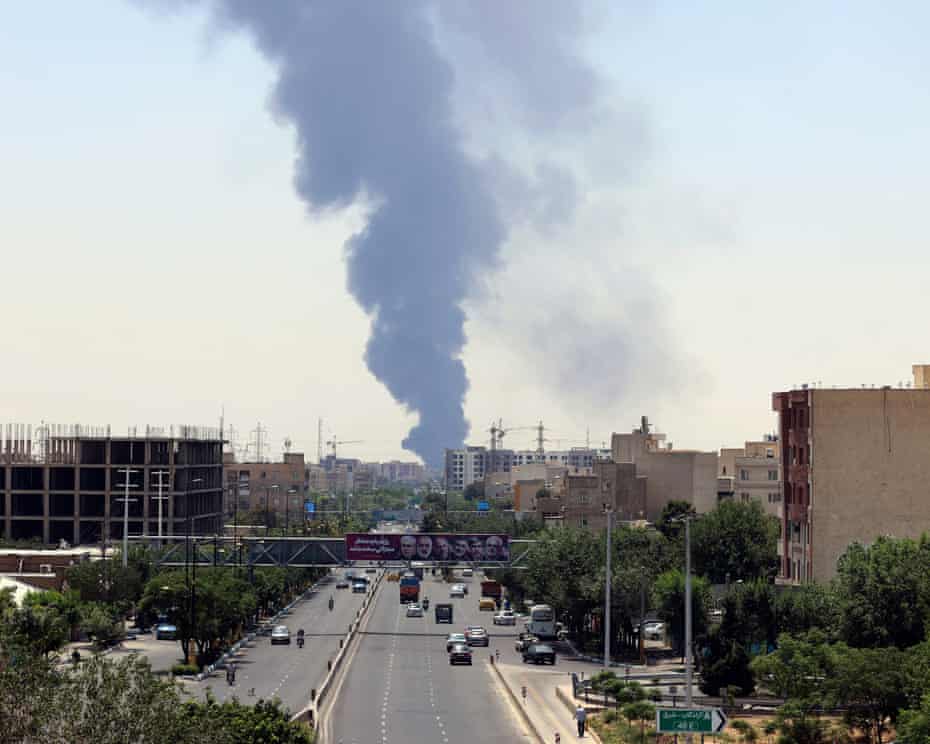Israel has launched major attacks on Iran’s energy infrastructure and defence ministry for a third consecutive day, deepening an already deadly conflict. Several Iranian missiles evaded Israeli air defences on Saturday night, striking a refinery and ripping through a high-rise apartment block in Bat Yam, just south of Tel Aviv.
As fuel depots outside Tehran blazed, US President Donald Trump presided over the nation’s largest military parade in decades. He later warned Iran that any attack on American interests would be met with unprecedented military force.
Posting on social media, Trump said: “If we are attacked in any way, shape or form by Iran, the full strength and might of the U.S. Armed Forces will come down on you at levels never seen before.”
There is little doubt that Israel is hoping for American support in its campaign. US weaponry is the only means capable of reaching Iran’s most fortified nuclear sites, including the Fordow enrichment facility buried deep beneath a mountain.
Iran has since suspended nuclear negotiations with the US and labelled Washington a “partner” in Israel’s offensive, launched on Friday. However, Tehran has so far refrained from attacking American bases, embassies or other regional interests.
With much of its top military leadership assassinated, and Israel claiming aerial dominance from western Iran to Tehran, the Iranian regime faces what many are calling an existential threat. Several key nuclear sites are reported to have sustained significant damage.
In a possible nod to Trump’s reputation as a dealmaker and his campaign promise to avoid foreign wars, Iran’s Foreign Minister Abbas Araghchi indicated Tehran could be open to dialogue. “If Israeli strikes stop, our responses will also stop,” he said.
Trump had earlier posted: “We can easily get a deal done between Iran and Israel, and end this bloody conflict!!!”
The United States is currently working to pass messages to Iran aimed at “calming tensions” with Israel, according to Haaretz, though the effort stops short of formal mediation. Trump is said to have spoken with Russian President Vladimir Putin and Qatar’s Emir, Sheikh Tamim bin Hamad Al Thani, who has been in direct contact with Iranian President Masoud Pezeshkian since Friday.
G7 leaders en route to a summit in Canada are expected to use the opportunity to urge Trump against further escalation. German Chancellor Friedrich Merz has spoken to Oman’s Sultan Haitham bin Tariq Al Said, who was previously scheduled to host US-Iran talks, emphasising the need to halt hostilities and prevent Iran from acquiring nuclear weapons.
Saturday night marked the deadliest phase of the conflict so far for Israel. Despite success in dismantling parts of Iran’s missile systems, a wave of over 200 Iranian missiles and dozens of drones breached Israeli defences. At least 20 projectiles landed, causing widespread damage and casualties.
Ten people were killed in Iranian strikes on residential areas, including three children, and more than 200 were injured. Emergency services continued searching on Sunday for four missing persons trapped beneath rubble in Bat Yam.
An Israeli military official, speaking anonymously, admitted: “In these amounts, hundreds of projectiles, sadly there will be hits. Even the greatest aerial defence system doesn’t get to 100%.”
Prime Minister Benjamin Netanyahu visited the strike site on Sunday, meeting with first responders and vowing retribution. “Iran will pay a very heavy price for the premeditated murder of civilians, women and children,” he said.
Yet, Israel’s air raids on Iran have also taken a heavy toll. Dozens of Iranian civilians have reportedly died since Friday, including at least 30 children in a high-rise collapse in Tehran on Saturday. Israel maintains it does not deliberately target civilian areas.
Iran launched about 70 missiles and multiple drones overnight, with Israel reporting greater success in intercepting the slower-moving aircraft. Still, one missile struck a refinery in Haifa, damaging pipelines and forcing temporary shutdowns, though no casualties were reported.
Netanyahu has defended the campaign as a necessary pre-emptive move to counter Iran’s nuclear ambitions. “The threat was critical. We had to act,” he said.
In the latest round of strikes, Israeli forces targeted dual-use infrastructure, including a major oil depot near Tehran and a refinery in Bushehr province along the Gulf coast. Civilians near known arms facilities in Iran have been advised to evacuate their homes.
An Israeli military official confirmed more attacks are planned in the coming days to disrupt Iran’s estimated 2,000-missile arsenal.



